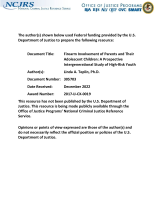Evidence-based practices
The Differential Impacts of Probation Staff Attitudes on Use of Evidence-Based Practices
The Risk-Need-Responsivity Model: How Do Probation Officers Implement the Principles of Effective Intervention?
A Multi-Level Examination of Organizational Context on Adult Probation Officer Attitudes Toward Evidence-Based Practice
Street-Level Decision Making Acceptability, Feasibility, and Use of Evidence-Based Practices in Adult Probation
How Can Research Mediators Better Mediate? The Importance of Inward-Looking Processes
Face Recognition Accuracy of Forensic Examiners, Superrecognizers, and Face Recognition Algorithms
Monitoring Technologies for Community Supervision
Forensic Technology Center of Excellence, Fiscal Year 2021
De-escalation Training: What Works, Implementation Lessons, and Taking It to Scale; Plenary at the 2023 NIJ Research Conference
Police use of force, while infrequently used, is a tremendous concern to public safety in the United States when officers employ it excessively or inappropriately, causing injury or death and eroding public trust in law enforcement. This plenary from the 2023 NIJ Research Conference describes the Integrating, Communications, Assessment, and Tactics (ICAT) de-escalation training program developed by the Police Executive Research Forum to guide officers in defusing critical incidents.
See the YouTube Terms of Service and Google Privacy Policy
Can Science Enhance Equity? Findings and Implications From a Study To Detect Bruising on Victims with Dark Skin Pigmentation
This plenary panel from the 2023 NIJ Research Conference features fascinating research on a methodology to improve the detection and documentation of bruises on victims of violence who have dark skin pigmentation. This study highlights the intersection between science, justice, and racial equity, featuring practitioner and victims’ advocacy perspectives. The discussion describes the research and its findings and explore strategies to ensure that this particular evidence-based methodology can be widely implemented by nurse practitioners in the field.
Participants:
See the YouTube Terms of Service and Google Privacy Policy
Meeting People Where They Are to Improve Institutional Culture
Incarcerated individuals deserve opportunities for healing and growth, but they often lack the necessary resources for such opportunities. Additionally, organizational cultures that don’t support these outcomes often stand in the way. Researchers and practitioners gathered at NIJ’s 2023 National Research Conference to share ideas and projects that will increase opportunities for incarcerated populations around the country. This show continues their conversation.
Progressing from Evidence to Action
Progressing from Evidence to Action
A large body of research on crime and justice is available, yet it can take years for findings to influence practice in the field. During a recent panel at NIJ’s 2023 National Research Conference, researchers and practitioners shared ideas and discussed practical steps and promising new approaches to inspire change. Three guests join the show to continue their conversation: Dr. Tamara Herold, a senior advisor to NIJ, hosts Dr. Shon Barnes, the police chief of the Madison (Wisconsin) Police Department, and Dr.
Driving Down Gun Violence, Part 2
Three LEADS Scholars serving in different law enforcement agencies and positions discuss their experiences with identifying and implementing evidence-based interventions to reduce gun violence. NIJ Senior Advisor Dr. Tamara Herold hosts this conversation with guests Police Chief Cecilia Ashe (Milford Delaware Police Department), Chief of Staff Lieutenant Matthew Barter (Manchester, NH Police Department), and Analytical Services Manager Mr. Jason Schiess (Durham, NC Police Department).
Driving Down Gun Violence, Part 1
Three LEADS Scholars serving in different law enforcement agencies and positions discuss their experiences with identifying and implementing evidence-based interventions to reduce gun violence. NIJ Senior Advisor Dr. Tamara Herold hosts this conversation with guests Police Chief Cecilia Ashe (Milford Delaware Police Department), Chief of Staff Lieutenant Matthew Barter (Manchester, NH Police Department), and Analytical Services Manager Mr. Jason Schiess (Durham, NC Police Department).
The New Frontier: Leveraging Innovative Technologies To Prevent Bullying
NIJ Director Nancy La Vigne Discusses Evidence-Based Strategies for Successful Reentry
NIJ Director Nancy La Vigne highlights the importance of evidence-based strategies for successful reentry. This strategy emphasizes the need for tailored and holistic support that starts during confinement and continues after release, with a focus on family involvement, cognitive-behavioral therapy, and community supervision.
See the YouTube Terms of Service and Google Privacy Policy
Translating Evidence-based Practices from Community to Corrections: An Example of Implementing DBT-CM
Firearm Involvement of Parents and Their Adolescent Children: A Prospective Intergenerational Study of High-Risk Youth
Needs Assessment of Forensic Laboratories and Medical Examiner/Coroner Offices: A Report to Congress
A New View of Jails: Exploring Complexity in Jails-Based Research
The future of jails-based research lies in challenging traditional mental models of jails and building on system and complexity science.





